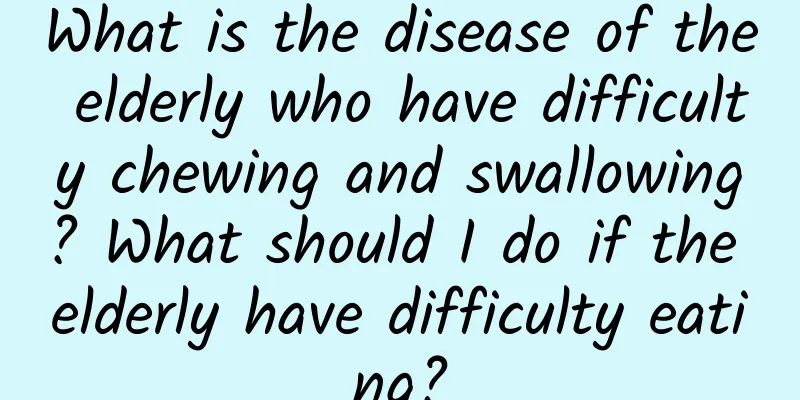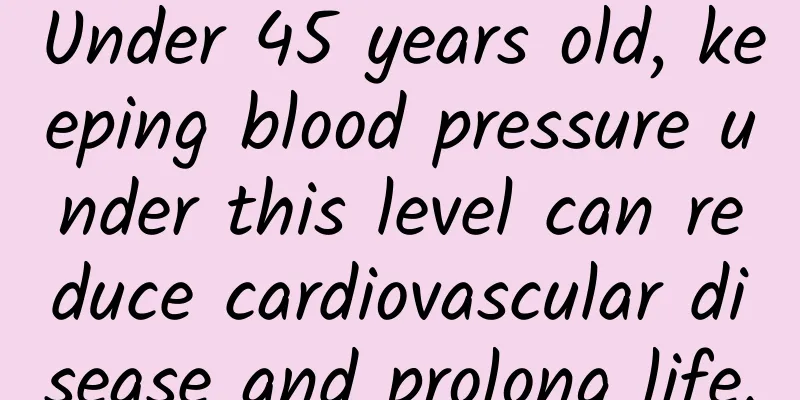What is the disease of the elderly who have difficulty chewing and swallowing? What should I do if the elderly have difficulty eating?

|
As the elderly age, their body functions will deteriorate, and taking care of them requires more patience. Some elderly people even have difficulty chewing and swallowing, which is actually a symptom and still requires careful care. What is the disease that makes the elderly unable to chew and swallow?Chewing disorder refers to the difficulty in cutting, mashing and grinding food in the mouth by relying on teeth, chewing muscles, etc. Dysphagia refers to the obstruction of food from the mouth to the stomach and cardia during the eating process, resulting in a feeling of obstruction in the pharynx, behind the sternum or in the esophagus. Elderly people may experience chewing disorders or dysphagia due to oropharyngeal diseases, esophageal diseases, neuromuscular diseases or other systemic diseases, which may affect their eating. What to do if the elderly have difficulty eatingDepending on the severity of chewing disorders or dysphagia, foods with different properties can be selected. If the elderly have mild dysphagia, it is recommended to choose staple foods that have been steamed or boiled to soften, leafy vegetables and eggplants that are easy to cook and soften, softer fruits, boneless fish, boneless poultry and livestock meat, ground soy milk and nuts. Avoid eating fried foods, foods with large and hard particles, and root vegetables containing crude fiber. If the elderly have moderate chewing disorders or mild dysphagia, they should choose to eat semi-liquid foods, such as dairy products, soft and mushy noodles, steamed and soft boneless and thornless meat, leafy vegetables, etc. If the elderly have obvious swallowing difficulties, they should choose pureed food. They can first steam and cook the appropriate ingredients until they are soft, then use a blender to process them into a puree before eating. What to do if the elderly don't like to drink water or eat1. Exercise moderately, which can consume some water and make you feel hungry and thirsty. 2. Drink tea and chat. You can unconsciously drink more tea while chatting. 3. Meals are served with soup or porridge. You can add your favorite food to the soup or porridge according to the elderly’s taste. 4. Communicate more and receive attention to make the elderly happy |
<<: Can you still eat rotten fruits? What is the reason why fruits are prone to rot?
Recommend
Do you hold your urine during NT examination?
The NT examination is a surgical procedure for sc...
When do girls get pregnant?
Throughout the history of human evolution, women ...
Endometrial thickening signs of cancer
The uterine wall is a defense of the uterus and a...
One line is dark and the other is light, does it mean you are pregnant?
Most women use pregnancy test sticks when they su...
What are the symptoms of adenomyosis?
Many people do not understand adenomyosis, which ...
Will back pain during confinement leave a root of disease?
Women will go straight into the confinement perio...
Is it easier for a short pregnant woman to give birth naturally?
In fact, a pregnant woman's short stature has...
Can pregnant women have their teeth cleaned? Be careful
The love of beauty is everyone's nature. No m...
World ALS Day | Correctly understand ALS and scientifically diagnose and treat ALS
The International Alliance has designated June 21...
What are the dangers of getting angry during pregnancy?
I believe many friends know that pregnant women s...
Can the enlarged feet after pregnancy be restored after giving birth? When can the enlarged feet after pregnancy be restored?
We all know that after a woman becomes pregnant, ...
Bump: What makes people happy to share? [Data Infographic]
Bump is a popular app on iPhones and now it is al...
What's wrong with the foreskin being torn?
The male genital area needs special protection. I...
What is the best way to drink honeysuckle tea? What should you pay attention to when soaking honeysuckle in water?
Honeysuckle is a common plant in our lives. Becau...
What are the breast changes during pregnancy?
Women will experience major changes in their bodi...









